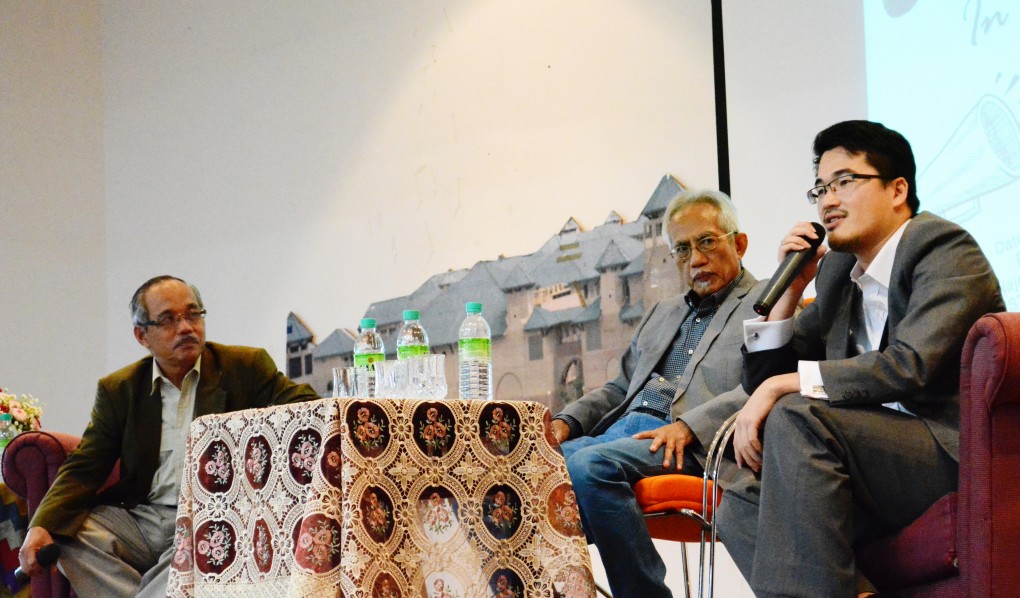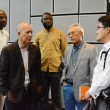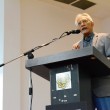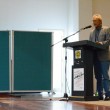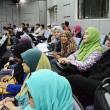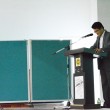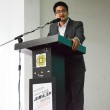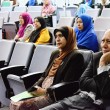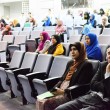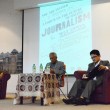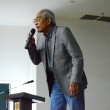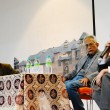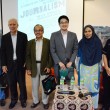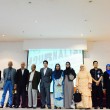By Hafiz Asnawi
GOMBAK, 11 November 2015: The problem faced by journalists nowadays is not about technology but rather the profession itself because technology acts only as a medium to spread the message or information written by journalists, but the real problem is when journalists themselves do not understand deeply the rules of journalism, a forum on ‘Future of Online Journalism” was told today.
Prominent journalist and blogger, Datuk A. Kadir Jasin said, “Because we think that media technologies were used to spread the information, (it’s only television and radio but not internet), from here we already created a mistake that led us straight to cause the fall of journalism standard.”
Datuk Kadir was formerly the Chief Group Editor of New Straits Times during the late 1990s and early 2000.
“Journalists as practitioners should balance their knowledge in traditional medium and modern means, which is online medium in order to catch up with this new era because journalism is important wherever and whenever you are.”
He was giving his explanation on how journalists have been influenced by current changes in Malaysia and seen as affecting the quality of journalism in the country lately.
The rapid transformation of traditional media to modern online media, he said, is because people are more likely to read information on screen rather than on paper, and this has affected the business of newspapers.
Datuk Kadir stated that the reason why people have stopped buying newspapers and magazines is because the same information printed on newspapers and magazines are now available online, free and much faster than newspapers and magazines.
Another factor, he said, is that some parties were using the newspapers and magazines as an expression of their political ideologies that created conflicts among leaders and closely linked to the law and the government which led to public rejection of the traditional media.
The forum on journalism under the theme “The Advancement of Journalism Profession in the Internet Era” was held at Experimental Hall in IIUM and attended by some 200 students from the Kulliyyah of Islamic Revealed Knowledge and Human Sciences.
It was organised by Media and Communication Centre with support of the Institute of Public Relations Malaysia Student Association (IPRMSA)-IIUM Chapter in collaboration with Universiti Sains Islam Malaysia (USIM). The objective of the forum is to expose students to current knowledge of journalism and the extent technology has influenced the role of journalists.
Also in the panel was the President of Foreign Correspondents Club of Malaysia, Shannon Teoh, who is also an active online journalist. The forum was moderated by former Executive Editor of BERNAMA, Zainoor Sulaiman.
Present at the forum were former rector and currently a senior academic member of Communication Department, Prof. Dato’ Sri Dr. Syed Arabi Idid, Head Department of Communication, Dr. Zeti Azreen Ahmad, and senior lecturers from IIUM’s Communication Department as well as lecturers from USIM.
Shannon Teoh, a journalist of Straits Times (Singapore), in his presentation on “Impact of Online Journalism on Foreign Media Reporting” shared Kadir’s opinion that people are likely to choose online journalism instead of traditional media because of the content management system where people can edit the stories and put pictures, and this could only be done by digital news.
He added: “People prefer online news because the information from internet are much faster and convenient because of the widespread of internet connection in this new era compared to the traditional news.”
He then explained to the audience how internet has now become one of the major sources of information for journalists.
“In order to know what readers like or don’t like, we can track them by how many people clicked and shared on ‘hot’ or ‘trending’ article that we posted on internet,” he said.
Shannon mentioned a website called digg.com for those who would like to share news and discover the global trending article, information and news. He said people are more likely to focus on what they want to find out on the spot and with the internet, the user can easily find the information by only clicking rather than spending time turning the pages of newspapers.
“When the online journalist wrote something on the internet, it stays forever. If they wrote something trending article like the vaping stories, they will provide a link at the end of their article to relate with previous article for readers to follow up with the stories.”
He said the information from the internet is always interacting with one another because one information can be available through many kinds of website and it is like a cycle and the information will go on and on.
It’s the people or the readers who decided where a journalist is going because “we write stories or give out information based on what people want to know,” he said.
During the Q and A session in response to the questions from the floor, Datuk Kadir shared his idea on the qualities of a journalist required by the industry where he said “you must love and have passion to write, get ready to work for long hours with very little payment.”
He said journalism is a subjective profession where there are no rules implied like the policemen or soldiers. “The things we do and we wrote have a massive impact on society, therefore, we must have strong consciousness whereby the real journalist must understand the law of the country so they won’t get into trouble with the law.”
He added, “As a journalist, don’t you ever forget or change the rules of journalism, write and reply.”
Meanwhile, Prof. Dato’ Sri Dr. Syed Arabi Idid shared his advice for future journalists to have commitment in the profession “because you will need to write, edit and publish news as long as you don’t go overboard by going against the law.” ***
